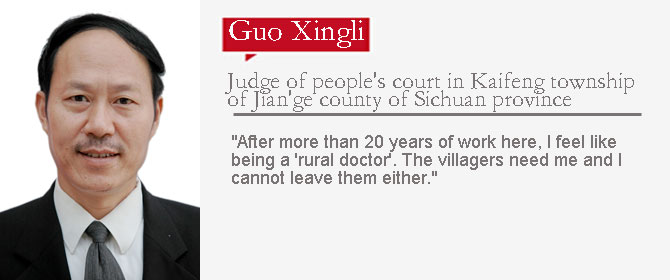Editor's Note: As an important foundation of a modern nation, ruling the country by law has been made a top priority by the government. To make every Chinese "bask in the sunshine of fairness and justice", numerous people have made their contribution. Among them are lawyers, judges, journalists, and scholars. Here, we take a look at some of them who have left their mark on China's road to justice.

Just like what Guo Xingli said in his previous speech titled "My dream, my road", promoting the rule of law in remote villages is more than a job for him - it is a lifetime pursuit.
Having been working as a grassroots judge in Kaifeng town, Jian'ge county of Sichuan province for 24 years, Guo is dubbed "pack basket judge" by local people for his decades-long image of carrying pack baskets to villagers' homes to handle cases.
Nickname taken as honor
Located in mountainous area of Jian'ge county, Kaifeng had no highways in many places before 2008, which means local residents could only walk to the court for lawsuits.
One day in 1993, an old couple was late for the opening of the court for three hours. After learning that they spent half a day on the road and had walked for more than 15 km (9.32 miles), Guo decided to move the court out to the litigants' homes to save them from long journey.
Each time he went out to a villager's place, he would carry a pack basket which was often used by local people when walking on mountain road. Inside the basket, there were national emblem and other necessary materials to "open court".
The court can take place at a yard, or on the field, or just wherever they put the national emblem. Villagers later gave him the nickname "pack basket judge".
"I take it as their approval and trust about my work," Guo said, "It's the highest honor I've ever earned."
Lifetime career
As highways were built in the county in recent years, Guo now can drive a car to most places in the town. But for some remote villages, he still has to carry the pack basket and walk a long journey.
In the past 24 years, he has handled more than 2,600 cases, with none of them having mistakes in trial or execution.
"I can see that the awareness of law among local residents has been much improved," Guo said.
When asked whether he has thought of leaving Kaifeng, Guo said, "After more than 20 years of work here, I feel like being a 'rural doctor'. The villagers need me and I cannot leave them either."
Words for two sessions
As the country convenes its annual two sessions in Beijing, Guo talks about his expectations for legal construction in grassroots level.
"Personnel shortage and lack of funds are two main obstacles for the development of grassroots courts," Guo said, "I hope the government could continue to increase its support for us."
"It is high time that we advance the rule of law in the country, and having a sound legal system in rural areas is an important part of it," he said.
Related Stories